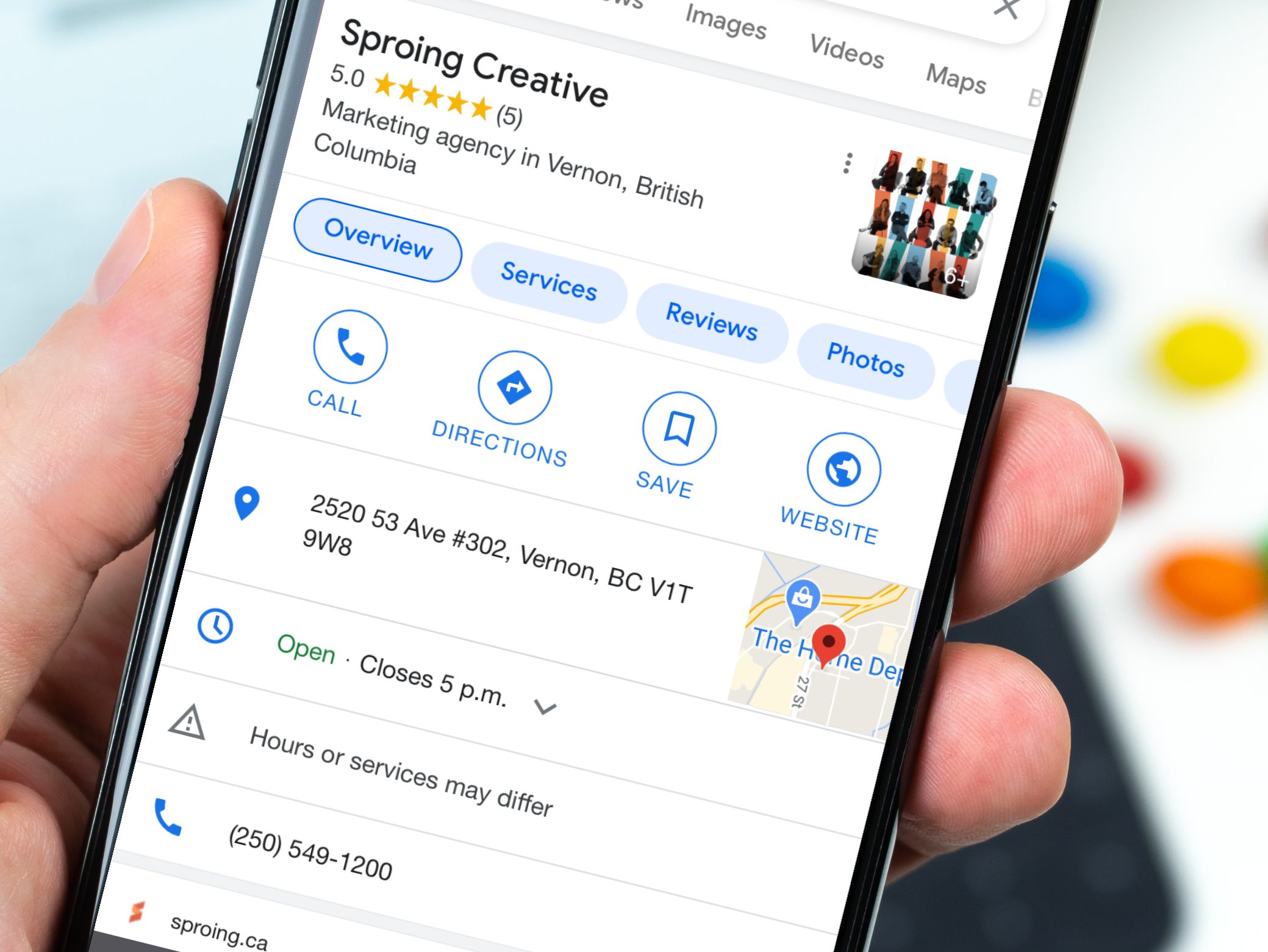So You Want Your Website To Show On Page 1?
Don’t we all!
The first page of Google is prime online real estate. It’s the promised land in the world of Search Engine Optimization (SEO), ripe with confusion over the best methods to get there (and stay there, for that matter.) Let’s begin with some sobering facts and get the negativity out of the way:
Over 90% of online content gets absolutely no traffic from Google.
Those numbers dilute further when factoring in first-page placement, a solid SEO strategy’s primary goal. According to this WebFX article, only 25% of Google users will even make it to page two of the search results!
Here at Sproing, we’re frequently asked: “Why isn’t my site ranking at the top of Google’s search results?” It’s difficult enough for businesses to swallow a good website’s cost, let alone discovering they don’t rank well for relevant searches. Understandable, right?
So, you want your website to rank on the first page? In the following post, we’ll show you the best places to start. We first explain what SEO is and what it isn’t, each fundamental to the question at hand. We’ll then bust out common problems to mitigate and then dip our toes into more advanced territory. While the world of SEO is vast, we hope to simplify it just enough to light the way toward your search ranking aspirations.
Let’s get to it!
SEO – Now You See Me, Now You Don’t
Providing someone with a direct URL link for your website enables them to visit it. But, what if this same person only knows the name of your business, or perhaps what you sell? What if they aren’t looking for you at all, but connecting with them could result in sales?
Without an SEO strategy, these searchers may not find what they need. Bummer! What’s the deal?

This frustration stems from misunderstanding how search engines work, so let’s get you in the know. Search engines revolve around the following principle:
Search engines are question processors. When faced with questions, no matter how complex, the search engine provides the user with the best answer.
Google doesn’t know that your product is fantastic or that your service is exemplary unless you give it a reason to do so. The sole focus is providing users with relevant answers on a search-by-search basis. Search engine optimization is the comprehensive strategy working to convince Google that your business is the most relevant answer to specific questions.
Thus, SEO is not a one-time activity. It’s not a bank that Google accepts money for to help you rank. More importantly, SEO is not just your website! Optimizing your search engine ranking requires a more thorough, long-term strategy starting with some easy steps. Momentum, here we come!
First, Handle The Biggest Hurdles
It’s not possible to create effective SEO strategies without handling more elementary hurdles. Jumping these hurdles first provides you with a strong SEO base.
Take an honest look at your website. How up-to-date is it? When you compare it to modern websites, how does it hold up? Other website considerations include:
- How technically sound is your website? Does it contain important technical elements ( such as meta-tags and robots.txt files)? And is it mobile responsive?
- Does your website look straight out of the ’90s? AKA: If your website was a person, would it still be hanging out with Windows ‘98?
- When did you last publish content? Are there any broken pages and links, or underlying security issues?
The next hurdle is ensuring you have a Google business listing (while making sure it’s optimized.) This allows for a localized web presence. When someone searches for your website in a local area, you want the business listing map-box to populate, giving users a quick dose of your business’s information.

The final hurdle surrounds your social media presence. At the very least, you should have social media profiles corresponding to your website with all profile information available for visitors. To take this one step further, posting regularly with relevant content can also gradually move the SEO needle ahead.
Give Google every possible reason to rank your website, and fix those critical issues preventing it from doing so.
A Brief Traverse In Technical Terrain
You’ve now removed some barriers to Google ranking your website. If the last section was about prevention, this section is about influence. Influencing Google requires consistency and a long-term mindset.
Due to the complexity of the following SEO strategies, remember they’re just starting points. We’ll expand on them in future posts but know that we’re always available to help! We recommend building your SEO habits modestly, prioritizing consistency over everything else. Here are our favourite starting points:
Website Content
Think strategically about your website content. Begin by Identifying your target audiences and the voice and tone required to connect with them. These are your people, and your website should speak to their needs, desires and pain points. Connect them to the solutions they need by using the right keywords and phrases. Following through on this convinces Google that you are well-equipped to serve them. Hallelujah!
Website Quality & Usability
Search engines will treat two local businesses offering near-identical products in very different ways. Why? The answer may lie in website quality and usability. Google prioritizes websites with lower bounce rates and longer session durations, for example. The more appealing your website is and the better it speaks to visitors’ needs, the more it influences Google’s search engine to optimize your website. By having a longer time on page, this shows Google your website sufficiently answered the users searching intent. The same goes with usability; Keeping users engaged continues to convince the Google machine to favour you over your competitors.

Blogs & Link Building
On a more specific level, Search Engine Optimization is all about keywords! Ask yourself what keywords you’d like to rank for in search engines. If you’re an Italian restaurant, for example, such keywords might include “local restaurant”, “Italian food,” or “spaghetti”. Don’t be surprised if you come up with dozens of keywords! Validate your choices with some formal keyword research afterward to make sure people are actually searching for those keywords. There’s no point in trying to rank for keywords that people aren’t even searching for!
In reviewing these keywords, the need for a structured approach becomes clear. You won’t be able to write one blog post that includes all your best keywords without the blog looking unfocused and, frankly, ridiculous. However, you can start grouping together keywords based on relevance and consistently add new posts or new website pages. Work down your list of keywords and combine them as much as reason will allow.
To be considered a valuable SEO activity, blog content needs to balance quality written content and SEO keywords.
As you build your blog portfolio, you can then start building links! This activity multiplies your SEO impact when done tastefully and consistently. Links provided in your blog content should always be relevant to your audience. Blogs should educate your audience and make them feel good about choosing your solution.
External links are also really important for SEO. This means other people are talking about and referring to your content, making you more credible!
Conclusion

To rank on page 1 of the top search engines is, by itself, an accomplishment worth celebrating. It takes work and a strategic approach with your website, online platforms and the content tied to each. It also takes continued effort to maintain search authority, crucial for keeping competitors from bumping you out of the coveted first page.
Your product or service is a gift, an answer to a problem within your community; SEO makes sure it gets the recognition it deserves.
In reading this, we hope we’ve sparked an SEO fire within you! With the right search optimization strategies, you’re well on your way to improving your desired search ranking.
SEO – The Sproing Difference
Our SEO specialists provide expert advice and tailored solutions to get your business ranking for the right keywords. Our structured approach begins with strategy and ends with results, helping you connect the dots between your website and the online presence it deserves.
From onsite and offsite SEO to keyword tracking and reporting with industry-leading tools, get ready to boost your online authority!
For more information on Sproing SEO services, visit this page.
To get your website up to speed, visit this page.